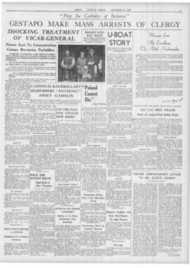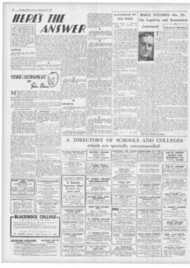Page 7, 29th September 1939
Page 7

Report an error
Noticed an error on this page?If you've noticed an error in this article please click here to report it.
Tags
Share
Related articles
Catholic Editors Have Audience With Pope
Vatican Newspaper Commends Mr. Chamberlain "supreme Step"
Vatican Newspaper's Comment
Osservatore Editor
Negotiation Is Possible But " Prestige " Is Bane Of...
"Poland Cannot Die"
—says Vatican
Writing in the Osservatore Romano, the semi-official Vatican newspaper, the editor, Count Della Torre. says: "Poland cannot die. We are not witnessing the end of Poland. Justice, and the goodness of humanity proclaim this fact no less than
"It has been said that peoples who do not defend themselves do not merit existence. It is still more true that the peoples who defend themselves have the right to live. " This is the case as regards Poland, which merits it doubly on account of the heroic resistance she put up simultaneously on two fronts.
" All those who are united in the same Catholic Faith, which is that of the Poles, feel and believe this firmly. They khow the danger which menaces Catholicism itself as well es the destiny of Poland : that is to say, the spirit and the torch of civilisation in Europe and in the world."
The Osservatore also speculates on the motives for the Soviet aggression against Poland. It sees the most likely reason in a renewal of Russian imperialism.
Russian Imperalism
" The natural tendencies of Russia are to establish herself in the whole of that vast space between the Baltic and the Pacific and to push out towards the south, that is to say, towards the lEgean Sea across the Balkans, and in particular through the Dardanelles, and so towards the Indian Ocean through Iran and Afghanistan."
The Vatican newspaper then recalls the theory that the German-Soviet Pact includes a secret convention regulating German and Soviet spheres of influence in Eastern Europe. It adds :
New Communist Danger
" One might believe that the Communist danger, as understood before the concluding of the German-Soviet Pact, no longer exists except in a few countries. It may be thought that the danger is now of a different nature, and this is why the actual conflict will be watched very carefully by all countries.
Each country will judge in what measure the result of the war will be able to increase or diminish the direct influence and real domination of the Communist power in Europe, in the East, in the Far East, and in the whole world, whether it works on its own or whether it co-operates with all the nations which might find themselves on its side."
blog comments powered by Disqus













